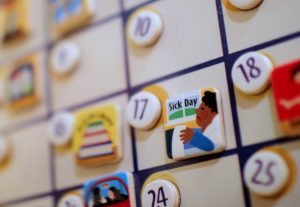A report has found a dramatic increase in the frequency and volume of employees calling in sick or working while ill.
Fruitful Insights, which conducted a two-year study, believes the 29% increase in self-reported sickness absence and 18% increase in presenteeism is due to new working ways.
The company believes the figures are against a backdrop of less than 0.9% improvement in productivity since 2020 and the highest sickness absence rate for a decade – which they say rings warning bells for employers.
The data and analytics business also found 41% of respondents are still likely to leave their job if they were offered a suitable alternative – which is now 40% for generation X, compared with 34% previously.
 Mike Tyler, Chairman and Co-founder of Fruitful Insights, said: “These numbers should represent a wake-up call for employers.
Mike Tyler, Chairman and Co-founder of Fruitful Insights, said: “These numbers should represent a wake-up call for employers.
“Despite everyone’s great sigh of relief as we returned to business as usual, there are still fundamental challenges around workplace wellbeing.
“Significant investment in wellbeing initiatives is made by many organisations, but major issues remain.
“We believe that although employers have the best intentions, they are really struggling to understand and measure the drivers of impaired wellbeing in their organisations – not to mention connecting wellbeing with productivity.
“Even when they do know what the problems are, they still need help putting in place meaningful and effective programmes.”
The research report, called Rethinking the future of workplace wellbeing – Managing change in the post-pandemic era, also showed a change in the type of illness being reported. While there were episodes of Covid-19, coughs, colds and flu – the percentage of mental health issues decreased slightly.
Fruitful Insights found a slight improvement in working relationships, which the company believes reflects a return to more normal working patterns. But there were differences across the generations.
A feeling of social disconnection was felt most keenly by Gen Z and Millennials, respectively, with Gen Zs indicating they are feeling 17% more disconnected from their local communities than they did during the pandemic.
Fruitful’s Clinical Psychology Advisor Dr Michelle O’Sullivan said: “Despite having been stuck in lockdown, often within their local communities, younger generations continue to show a worrying lack of connection to the people around them, and a reduced reliance on friends and families.
“Our increasing disconnection from the people we live with, work with, and connect with in our communities is not how we were designed to function as human beings.
“We are social animals and our mental wellbeing is strongly linked to the quality of our relationships.
“It’s critical that businesses support great social interactions as part of positive workplace environments and that we make spending time with friends and family easy.”
SHP Webinars
Find upcoming live, interactive webinars plus on-demand sessions to watch back at your convenience.
SHP runs regular health and safety webinars on a wide range of topics, from high level thought leadership, to legislation updates and technical guidance.
Click below to see what’s coming up and what you can watch right now...


